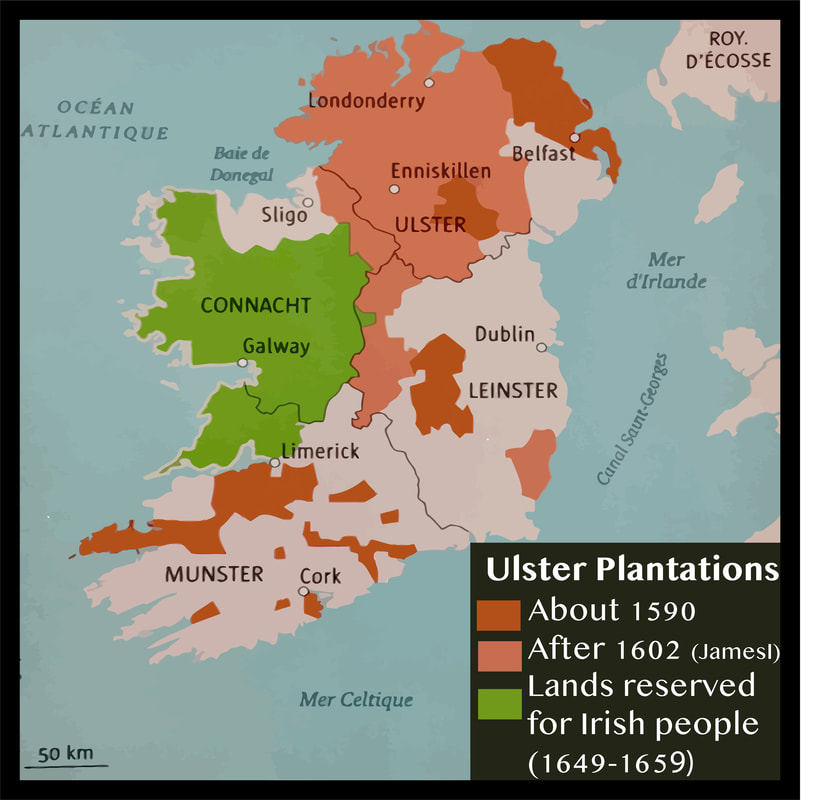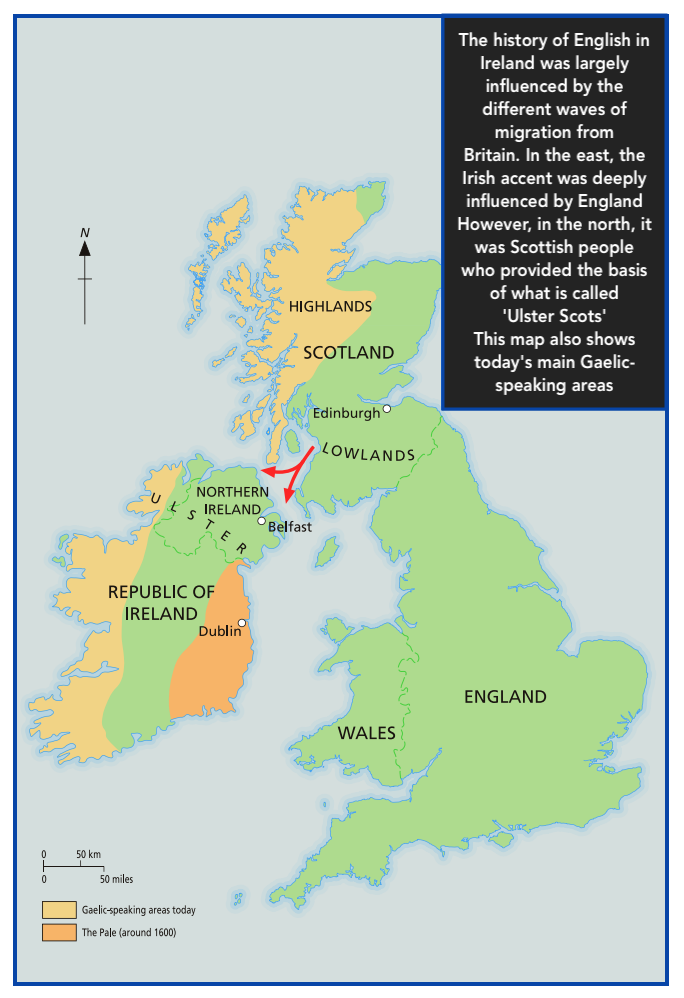Phonologie anglaise | The Irish Accent
L' acccent irlandais
Introduction
|
Irish English is often referred to as “Hiberno-English”, although the term Anglo-Irish is also frequently used. Hiberno-English has largely been influenced by the different waves of migration from Britain. The Plantations of Ulster had a strong impact on the variety of Irish spoken in the north. It displays similar features which can be traced back to the 17th century immigrants from the Scottish Lowland. As a consequence, it is often referred to as “Ulster Scot” or “Scotch Irish”. This dialectal variation is often heard in the north-east of Ulster. Other dialects spoken in the Ulster, such as Mid-Ulster or Ulster Anglo-Irish, display far less features of Scottish English. The reason is that the north-east of Ulster was settled by Scottish people while the other parts of Ulster were settled by English immigrants (especially from the west).
A ‘lilting brogue’
The Irish accent is often described as a ‘lilting brogue’. The Oxford Learner’s Dictionary defines ‘lilting’ as ‘rising and falling in a pleasant way’. The same dictionary gives us a precise definition of ‘brogue’: ‘the way of pronouncing the words of a language that somebody has when they are speaking, especially the accent of Irish or Scottish speakers of English’.
Some basic features of Irish English
|
Contenu reservé aux membres | Member Only ContentConnectez-vous pour lire la suite | Sign in to read more
|
If you are already logged in, please scroll down. | Si vous êtes déjà connecté, veuillez descendre.
|
|
|
- Its unvoiced partner /t/ tends to become /tʃ/
- As in Standard Scottish English, words that begin with ‘wh’ like ‘where’, are pronounced with an initial /h/ sound – the result should be something akin to [hwer].
- Some varieties of Irish accents do not pronounce the “th” sound /θ/ at the beginning of some words. As a result, “thing” and “this” might turn into something such as [tɪŋ] and [dæt]. This is especially the case in the south of Ireland.
- Words such as tea and key tend to be pronounced with /eː/ instead of RP /iː/.
- The sound /ɔɪ/ is often pronounced /əɪ/, especially in the south of Ireland.
- The pronunciation /r/ is nearly universal in Hiberno-English. This is call rhoticity. Like with General American and Scottish English (but not Received Pronunciation), this means that the letter <r>, if appearing after a vowel sound, is always pronounced (in words such as there, bar, or bird).
- As a beginning sound, /d/ [voiced sound] often sounds like / dʒ/. For example, the word ‘due’ is likely to sound like the word ‘Jew’.
- Its unvoiced partner /t/ tends to become /tʃ/
- As in Standard Scottish English, words that begin with ‘wh’ like ‘where’, are pronounced with an initial /h/ sound – the result should be something akin to [hwer].
- Some varieties of Irish accents do not pronounce the “th” sound /θ/ at the beginning of some words. As a result, “thing” and “this” might turn into something such as [tɪŋ] and [dæt]. This is especially the case in the south of Ireland.
- Words such as tea and key tend to be pronounced with /eː/ instead of RP /iː/.
- The sound /ɔɪ/ is often pronounced /əɪ/, especially in the south of Ireland.
La rhoticitié
Comme nous l’avons déjà dit, la plupart des accents irlandais sont rhotiques. C’est-à-dire que le <r> orthogprahique sera presque toujours prononcé. Si certains accents britanniques sont également rhotiques comme l’écossais ou l'anglais du nord, la rhoticité américaine est plus nettement prononcée. Observez : la prononciation du mot "bird" en fonction de la variété d'anglais.
Autres exemples de mots prononcés avec un anglais irlandais
You may also like :
- Dialects and Accents | The difference between a dialect and an accent
- Standard English [ Received Pronunciation ] | L'accent standard ou BBC English
- Cockney English | L'accent Cockney de East London et son Rhyming Slang
- Standard Scottish English | L'accent écossais
- The Irish Accent | L'accent irlandais aussi appelé "Hiberno-English"
- General American | L'accent standard américain (1ère partie)
- General American | L'accent standard américain (2ème partie)






